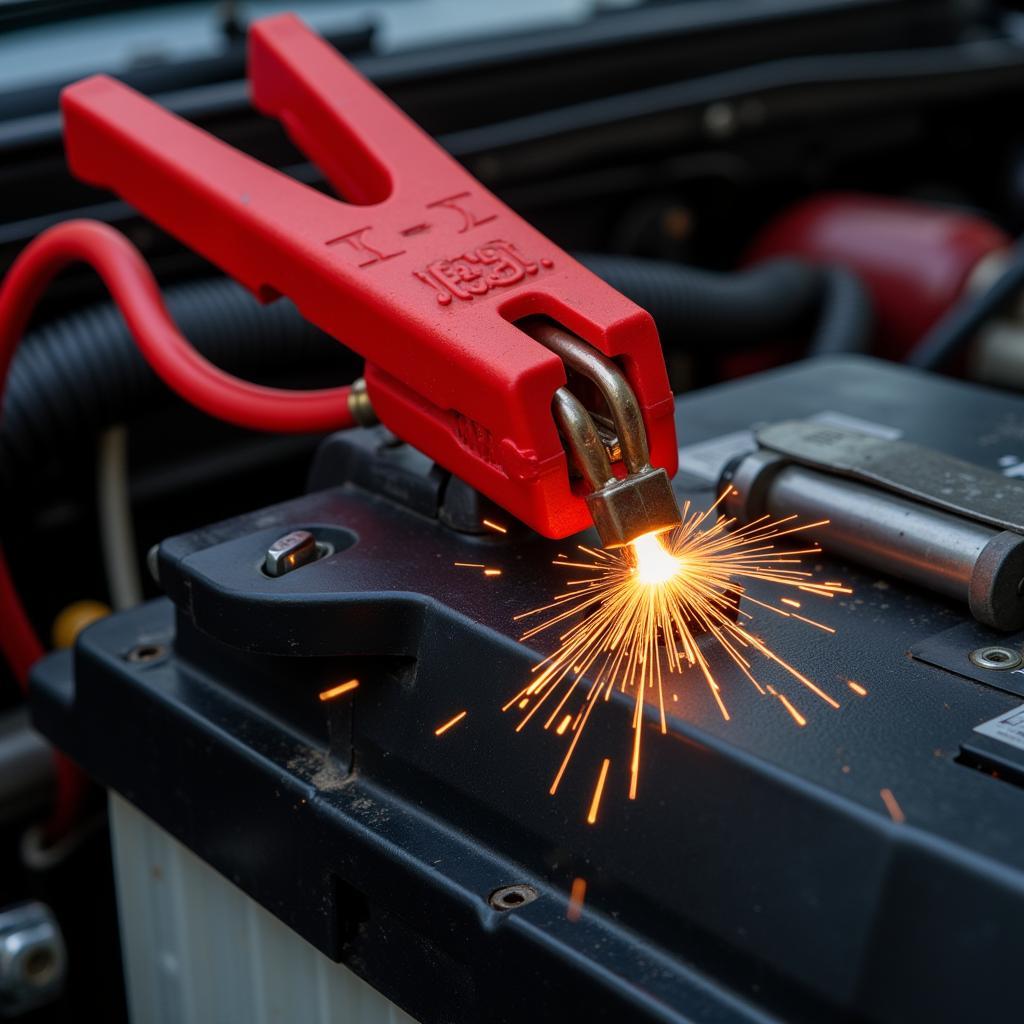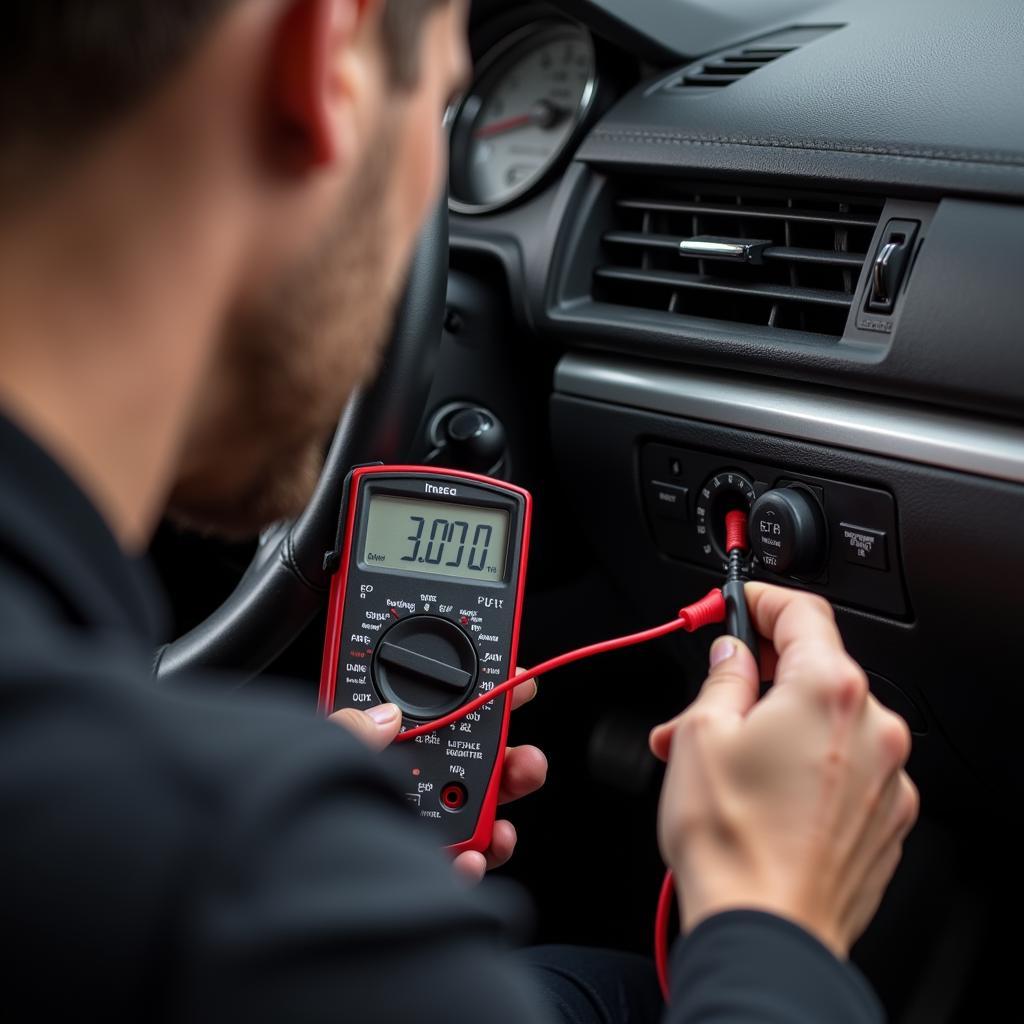Experiencing problems cranking your car can be incredibly frustrating. You turn the key, expecting the familiar roar of the engine, but instead, you’re met with silence, a disconcerting clicking sound, or a sluggish groan. Before you start panicking, understand that numerous issues can cause problems cranking a car, and many are easier to fix than you might think. This guide will walk you through common causes, troubleshooting tips, and possible solutions to get you back on the road.
 Car Battery Jump Start
Car Battery Jump Start
Common Causes of Car Cranking Problems
Let’s delve into the most common culprits behind your car cranking woes:
1. Dead or Weak Battery
The battery is the heart of your car’s electrical system, providing the initial power needed to start the engine. A dead or weak battery is the most frequent reason for problems cranking a car. If your headlights are dim, interior lights flicker, or you hear a clicking sound when turning the key, your battery is likely the issue.
2. Faulty Starter Motor
The starter motor is responsible for turning the engine over and getting it running. If you hear a grinding noise when you turn the key, or if the engine cranks very slowly, a faulty starter motor could be the problem.
3. Ignition System Problems
The ignition system delivers the spark that ignites the fuel in the engine. Issues with the ignition switch, ignition coil, spark plugs, or wiring can prevent the spark from happening, leading to starting problems.
4. Fuel System Issues
If your engine cranks but doesn’t start, the problem might lie within the fuel system. A clogged fuel filter, a malfunctioning fuel pump, or a faulty fuel injector can all prevent the engine from receiving the fuel it needs to ignite.
5. Sensor Malfunctions
Modern cars are equipped with numerous sensors that monitor various systems. A malfunctioning crankshaft position sensor or camshaft position sensor can prevent the engine from starting.
fuel injector problems keep your car from cranking can also lead to difficulties starting your vehicle, as the engine won’t receive the proper fuel-air mixture for ignition.
Troubleshooting Car Cranking Problems
Here are some troubleshooting steps you can take:
- Check the Battery: If you suspect a battery problem, try jump-starting your car. If the car starts, have your battery tested and potentially replaced.
- Inspect the Starter: Listen for unusual noises when starting. A grinding sound might indicate a failing starter motor.
- Examine the Ignition System: Check for loose connections, damaged wires, or worn-out spark plugs. You may need a mechanic to diagnose more complex ignition system issues.
- Consider the Fuel System: If you smell gasoline, there might be a fuel leak. Otherwise, a clogged fuel filter or a failing fuel pump might be the culprit.
- Check Warning Lights: Pay attention to your dashboard warning lights. An illuminated “check engine” light could point towards sensor issues.
When to Seek Professional Help
While some car cranking problems can be solved with basic troubleshooting, it’s important to recognize when professional help is necessary. If you’ve exhausted basic troubleshooting steps and can’t pinpoint the issue, it’s time to seek the expertise of a qualified mechanic. They have the knowledge and tools to diagnose and fix more complex problems.
Preventing Future Car Cranking Issues
Prevention is always better than cure. Here are a few tips to prevent car cranking problems in the future:
- Regular Battery Maintenance: Have your battery tested regularly and replaced before it fails.
- Keep Terminals Clean: Clean battery terminals with a wire brush and battery terminal cleaner to prevent corrosion.
- Timely Spark Plug Replacement: Replace spark plugs according to your car’s recommended maintenance schedule.
- Regular Fuel System Checks: Get your fuel filter changed regularly and address any fuel system issues promptly.
By understanding the common causes of car cranking problems and following these troubleshooting and prevention tips, you can keep your car running smoothly and minimize the chances of being stranded with a vehicle that refuses to start.
If you’re experiencing [engine problems that can sideline a car], it’s best to address them sooner rather than later to avoid further damage and costly repairs.
Conclusion
Problems cranking a car can be a real headache, but by understanding the potential causes and following the troubleshooting steps outlined above, you can often identify and resolve the issue. Remember, regular car maintenance plays a crucial role in preventing many starting problems. However, if you’re unsure about any aspect of diagnosing or fixing the problem, don’t hesitate to seek professional assistance from a qualified mechanic.
Need help with your car problems? Contact AutoTipPro for expert advice and assistance at +1 (641) 206-8880. Our office is located at 500 N St Mary’s St, San Antonio, TX 78205, United States. We’re here to help you get back on the road!






Leave a Reply